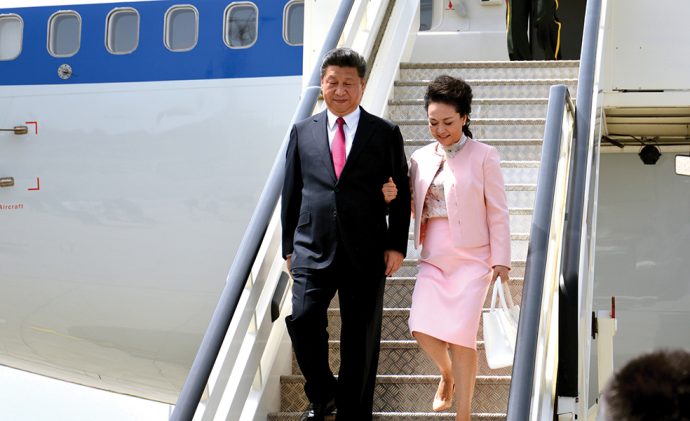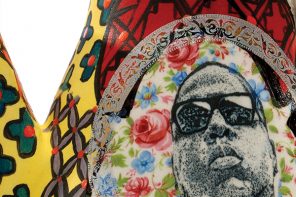During the closing ceremonies of any Olympics, the next host city/country is given a chance to shine.
At the closing ceremonies of the Winter Olympics in PyeongChang, South Korea, Beijing, China — host of the 2022 Winter Games — took the opportunity literally with performers dressed as illuminated giant pandas roller skating and flying. The dazzling tour de force lit up the Twitterati and had commentator Johnny Weir, WAG’s January 2014 cover guy, squealing with delight.
But what followed, though more subtle, was more significant. Xi Jinping — general secretary of the Chinese Communist Party and China’s president — came on the screen like a latter-day Wizard of Oz to welcome everyone to Beijing’s winter wonderland four years from now.
Two weeks later, China’s annual National People’s Congress in Beijing moved to rubber-stamp Xi’s bid to remain president for life — a move that has sent shock waves through the geopolitical landscape and would raise Xi to Mao-like status.
In the age of the “strongmen” — Syria’s Bashar al-Assad, Turkey’s Recep Tayyip Erdoğan, Israel’s Benjamin Netanyahu, North Korea’s Kim Jong-un, The Philippines’ Rodrigo Duterte, Venezuela’s Nicolás Maduro, Russia’s Vladimir Putin, and, of course, the United States’ Donald J. Trump — Xi may out-tough the other tough guys. If he does so, however, it will be without any Trump-et blast. Indeed, he’s the proverbial iron fist in the velvet glove or, more appropriately, the iron panda.
Xi speaks of socialism as the path to happiness, cloaks his smackdowns as an anti-corruption crackdown and spreads money — and thus Chinese influence — in Africa.
He’s creating a New Silk Road — a subject explored in WAG by our Sino expert Audrey Ronning Topping — that seeks to establish a Pax Sina in the way that people once spoke of a Pax Americana. It’s all part of the “Chinese Dream,” which might be summed up with the acronym MCGA — Make China Great Again.
Born in Beijing in 1953, Xi came by his Chinese Dream the hard way. His family benefited from Mao Zedong’s Cultural Revolution until it didn’t. His father, a high-ranking party official, was imprisoned and one of his sisters murdered. Xi himself was denounced by his own mother as an enemy of the revolution in a walk of shame. He wound up working on a farm and, escaping back to Beijing, digging ditches in a camp for deserters.
Xi went on to study chemical engineering at Beijing’s Tsinghua University — whose program included more farm work and Communist philosophy — later earning a doctor of law degree there. Along the way, he observed U.S. agriculture firsthand, staying with an Iowa family — a visit that left a considerable impression. Back home, he acquired a military patina by working for one of his father’s former subordinates on the Central Military Commission.
This seems to encapsulate his approach to life. Rather than be embittered by this experience, Xi — who was described by some who know him in a 2011 Washington Post article as “pragmatic, serious, cautious, hard-working, down to earth and low-key” — seems to have heeded the words of the Chinese philosopher Lao-Tzu: “Yield and overcome.”
After many attempts, he became a member of the Communist Party, cheerleading for it as he rose through its ranks and earning a reputation as tough on government corruption. Among his career highlights was orchestrating the dramatic 2008 Summer Olympics in Beijing when he was China’s vice president.
Now he stands on the top of the heap and many worry about what that will mean.
“Clear rules putting limits on the power of any one individual are critical for the success of any political system, democratic or not, because no one individual is ever wise or benevolent enough to rule indefinitely,” Francis Fukuyama, a senior fellow at Stanford University, wrote in The Washington Post. “Succession is therefore a point of weakness of all dictatorships. The lack of rules necessitates a damaging power struggle upon the death of the supreme leader.”
Reacting to Xi’s power grab, Trump said: “He’s now president for life. President for life. No, he’s great. And look, he was able to do that. I think it’s great. Maybe we’ll have to give that a shot someday.” He said this jokingly — we think.
Trump might think instead about whether Xi’s not necessarily benevolent dictatorship might lead China to eclipse America as sole superpower and whether making China great again will come at the expense of American weakness.





